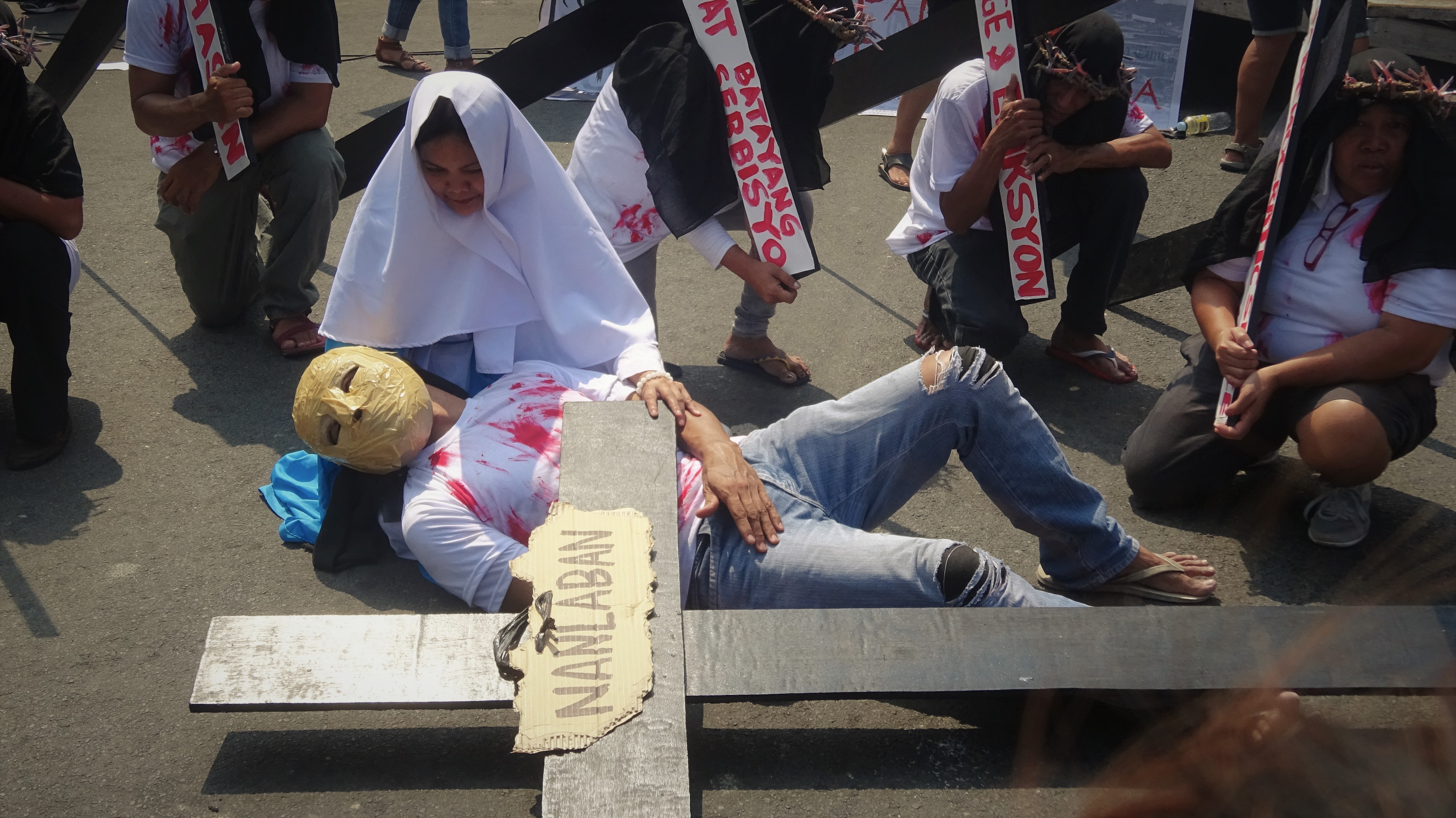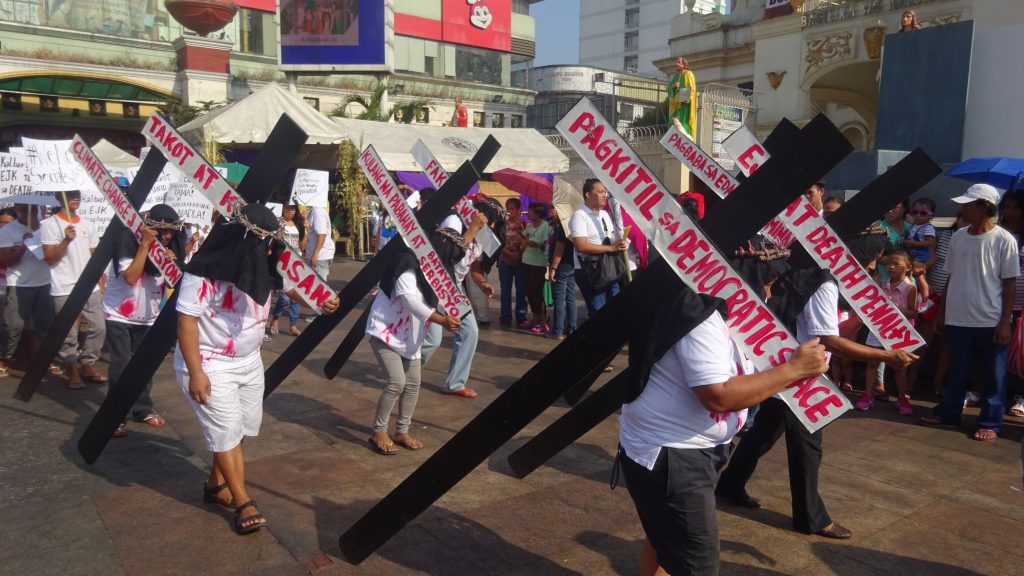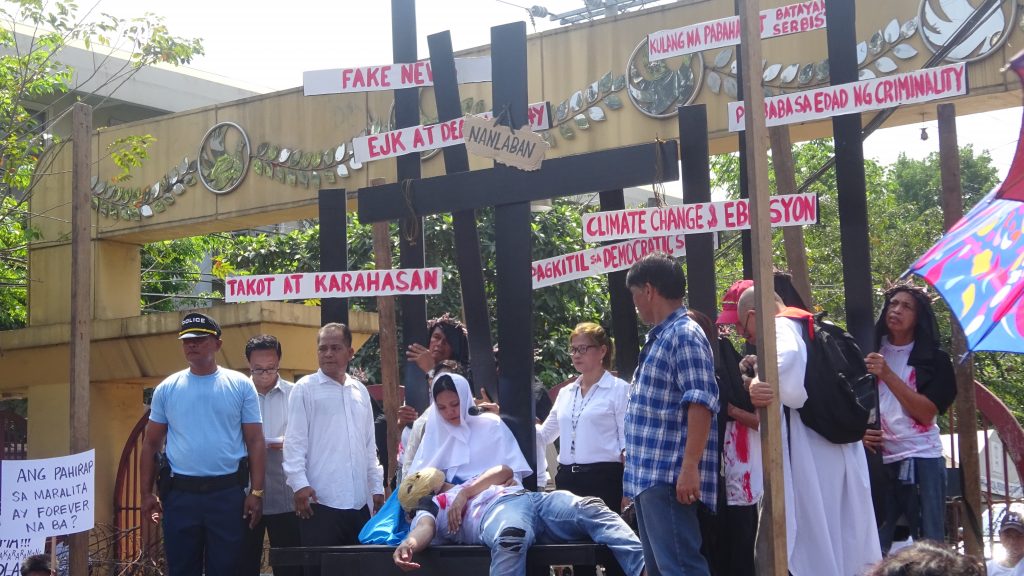JJCICSI joined the annual “Kalbaryo ng Maralita (Calvary of the Poor)” staged on Holy Tuesday, April 11, by various urban poor groups with their partner NGOs, the Urban Poor Associates (UPA) and Community Organizers Multiversity (COM). Led by urban poor community members carrying crosses representing the issue adversely affecting the sector, thousands of participants marched from Plaza Miranda to the Mendiola Peace Arch in Manila.
They lamented the seemingly endless suffering of the poor because of the following: (1) extra judicial killings and the reinstatement of the death penalty, (2) lowering of the minimum age of criminal responsibility, (3) inadequate provision of housing and basic services, (4) proliferation of fake news, (5) climate change and evictions, (6) culture of fear and lack of respect for women, and (7) decreasing space for the free and critical participation of the citizenry. Poor people, the groups said, bear the brunt of these issues, especially the brutal “war on drugs”, which has unfairly targeted drug users and pushers, alleged or otherwise, in poor communities. The kalbaryo concluded with the celebration of the Holy Mass led by Manila Auxiliary Bishop Broderick Pabillo and Fr. Robert Reyes.
Below is the statement of the issues in English and Filipino:
2017 Calvary of the Urban Poor
Statement of the Issues
First issue: Extra Judicial Killings and the Death Penalty. The culture of killing dominates our society today. Because of the government’s war against drugs, the flow of blood continues in our communities where the number of EJK cases is rising. People’s lives are being sacrificed in our country allegedly in the name of peace and order. Despite thousands of EJK victims, how many investigations have been carried out and how many victims have been given justice? As for the return of the death penalty, it is the urban poor as usual who will suffer. Because the poor in prison are not able to hire a good lawyer to defend them, it is again the poor who will be victimized. We are against drugs and condemn those who commit illegal acts. But suppressing them, especially for us poor, will not happen simply by killing them. We are after all also people with dignity, Filipinos who have human rights under the rule of law, including rights to life. Stop the killings! Eliminate the death penalty!
Second issue: Lowering of the Age of Criminal Responsibility. If the Bill to lower the minimum age of criminal responsibility of Filipinos is passed into law, then our children as young as nine years can be considered criminals. Thus, instead of helping the children and their parents to correct their mistakes, however serious these may be, our legislators are choosing cruel measures to inflict on still immature young children and eliminate any chance of as better future for them. Our leaders prefer to put them in jail and label them as criminals, a stain that will hang over them for the rest of their lives. How regrettable it is that our President and his allies believe that lowering the minimum age of criminal responsibility will stop children from growing up as criminals. We object to this belief. Incarcerating young children still immature in their thinking will more likely turn them into adult criminals. Assistance, not imprisonment, for our children!
Third Issue: Uncertainty in the Provision of Housing and Basic Services. Uncertainty regarding the availability of housing and basic services continues to contribute to the daily Calvary of the urban poor. The weight of the Cross on its bearers is reminiscent the hardships undergone in the past. The lack of decent housing is a blot upon the lives of poor people like us. Our right to decent housing which the government is not providing is a burden we are still carrying. When might our right to have decent housing be fulfilled in response to our longstanding requests? Focus on in-city housing! Address the needs of those relocated to distant off-city sites!
Fourth Issue: The Proliferation of Misinformation and Fake News. In reading, observing and listening, news comes to us from all over. People are actively expressing their views and opinions through social media. On the one hand, we have beneficial ways of gaining access to information and finding spaces to express our feelings. On the other hand, there is an apparent blurring of the truth so that we wonder whether what we are reading or hearing is truth or falsehood. What we see now is the spread of misinformation and fake news. Whether individuals or institutions, these providers should give us correct information as a means of ensuring that we do not get biased news or distorted visions. This confusing situation violates our rights to correct information and the truth. Rather, the truth that our government should confront is the hard life we as urban poor live. Listen to the poor – and all the kalbaryos that dramatize our long experiences of hardship in this unjust society.
Fifth issue: Climate change and evictions. The government frequently uses climate change as an excuse to evict us urban poor from the city and relocate us to distant off-city settlements. However, climate change is also an issue of social justice. As regards risk and disaster management, it is not only the location and physical conditions of our houses that matter; it is organized urban poor groups which formulate various procedures to mitigate the effects of calamities in our communities. In reality, our approaches to addressing calamities are undermined by the limited opportunities for permanent employment, the lack of benefits, and the small earnings stemming from our work and livelihoods. Therefore, instead of forcing us out of our places, what the urban poor need is decent work that is available in the city. Don’t use climate change as an excuse for evicting the urban poor from our places in the city.
Sixth issue: The Culture of Fear and Lack of Respect for Women. We condemn all instances of violence because it leads to the destruction of the family in creating fear among parents, older people, siblings and orphaned children, and bringing great distress to our community. Because of the violence caused by Oplan Tokhang, many are now afraid to approach and assist a neighbor in need, fearful they will be accused of coddling addicts or pushers. We agree with the government’s statements that only a false peace will be restored by its current efforts as no genuine peace can occur if human rights are violated and fear is sown among the citizenry. Violence must also be condemned, especially against women, along with widespread comments aimed at diminishing their worth as human beings. Considering women as commodities or things along with the double standard being displayed by our government officials are vulgar in relation to our mothers, sisters, and daughters. End the culture of fear; respect women!
Seventh issue: Decreasing space for the free and critical participation of the citizenry. Our democracy is genuine only if every person can state his or her viewpoints without coercion or threats from various officials in powerful positions. People will participate most effectively when they are not forced to agree to a certain point of view, especially if they feel that view is wrong. So, what really is the state of democracy in our country today? It appears that the space for free and critical expression is becoming smaller and smaller. Given this situation, the people begin to hold back from participating in the directions toward which the country appears to be moving, thereby losing the spirit of democracy. We will not agree to this trend of the government to remaining deaf to the voices of the people. Listen to the voices of the poor and recognize our right to participate in correcting the horrors taking place in our country.
2017 Kalbaryo ng Maralita
Pahayag ng mga Isyu
Unang isyu : Extra Judicial Killings at Death Penalty. Namamayani ngayon sa ating lipunan ang kultura ng pagpatay. Patuloy ang pagdanak ng dugo sa aming mga komunidad dahil sa giyera kontra droga ng pamahalaan, kung saan dumarami rin ang kaso ng EJK. Buhay ng tao ang ipinambayad sa ngalan ng umano’y katahimikan at kaayusan sa ating bayan. Subalit sa libu-libong biktima ng EJK, ilan ba ang iniimbestigahan at ilan ang nabigyan na ng hustisya? Sa pagbabalik ng parusang kamatayan o death penalty, ang maralitang tagalungsod pa rin ang magdurusa. Ang mga mahihirap na bilanggo, dahil sa kawalan ng kakayahang kumuha ng mahuhusay na abugado upang ipagtanggol ang sarili, ang maaring unang mapapatawan nito. Ayaw namin sa droga at kinukundena namin ang mga gawaing iligal. Subalit ang pagsugpo sa mga ito ay hindi makakamit sa pamamagitan ng walang pakundangang pagpatay, lalo sa katulad naming mahihirap. Kami rin ay mga taong may dignidad, mga Pilipino ring may karapatan sa tamang proseso ng batas, may karapatan sa buhay, at may karapatang magbago. Itigil ang mga pagpatay! Ibasura ang parusang kamatayan!
Pangalawang Isyu: Ang Pagbababa ng Edad ng Pananagutang Kriminal. Kung maisasabatas ang panukalang ibaba ang edad kung kailan maituturing na kriminal ang isang Pilipino o ang minimum age of criminal responsibility, ang ating mga anak sa murang edad na siyam ay maituturing nang mga kriminal. Sa halip na tulungan ang mga bata at ang kanilang mga magulang na maituwid ang pagkakamali, gaano man ito kalubha, mas pinipili ng ating mga mambabatas na pagmalupitan ang mga walang muwang na mga bata at pagkaitan sila ng kinabukasan. Mas nanaisin ng ating mga pinuno na ilagay sila sa kulungan at tawaging mga kriminal, tatak na bibitbitin nila hanggang sa sila ay tumanda. Nakalulungkot na naniniwala ang Pangulo at ang kanyang mga kaalyado na ang pagbababa sa minimum age of criminal responsibility ang paraan upang mapigilan ang mga kabataang lumaking mga kriminal. Sinasalungat namin ang sa paniniwalang ito. Ang pagbibilanggo sa mga batang murang isip pa lamang ang siyang lalong magbubunga ng henerasyon ng mga kriminal. Tulong, hindi kulong, para sa mga bata!
Pangatlong Isyu: Kawalan ng Katiyakan sa Paninirahan at Kakulangan sa mga Batayang Serbisyo. Ang kawalan ng katiyakan sa paninirahan at kakulangan sa batayang serbisyo ay patuloy na nararanasan at kalbaryo ng mga maralita. Inyong matutunghayan ang mga maralita na pasan-pasan ang krus, tanda ng mga paghihirap na dinaranas. Ang kawalan ng maayos na tirahan ay parang pagkitil na rin sa buhay naming mahihirap. Ang karapatan sa disenteng paninirahan na isinantabi ng gobyerno ay hanggang ngayon amin pa ring pasan-pasan. Kailan kaya makakamit ang katarungan para sa disenteng tahanan na aming kahilingan? Tutukan ang pabahay sa loob ng mga lungsod! Tugunan ang mga kailangan ng mga relokasyon!
Pang-apat na Isyu: Paglaganap ng Maling Impormasyon at Mapanlinlang na Balita (Fake News). Kabi-kabilang balita ang mga nababasa, napapanood, at napapakinggan. Pati sa social media ay aktibo ang mga tao sa pagpapahayag ng kanilang mga pananaw at opinyon. Sa isang banda, mainam ang pagkakaroon ng access sa balita at ang pagkakaroon ng espasyo para makapagpahayag ng ating saloobin. Ngunit sa kabila nito ay ang mistulang pagpapalabo sa katotohanan-ang mga nababasa at naririnig ba namin ay totoo o kasinungalingan? Kapansin-pansin ang paglaganap ngayon ng maling impormasyon at mapanlinlang balita. Maging ang mga tao at institusyong dapat maghatid sa amin ng tamang impormasyon ay nagiging kasangkapan sa pagpapalaganap ng walang batayang balita at baluktot na mga pananaw. Nilalabag nito ang aming karapatan sa totoong impormasyon at tunay na katotohanan. Ang kahirapan ang katotohanang dapat harapin ng pamahalaan. Pakinggan ang mga mahihirap, ang mga nakararanas ng kalbaryo ng kawalang katarungan sa lipunan!
Panglimang Isyu: Pagbabago ng Klima (Climate Change) at Ebiksyon. Madalas gamitin ng pamahalaan ang climate change upang kaming mga maralitang tagalungsod ay paalisin sa aming mga lugar at ilipat sa malalayong relokasyon. Subalit ang pagbabago ng klima o climate change ay isang isyu ng panlipunang hustisya o social justice. Ang pagiging lantad namin sa mga panganib at sakuna ay hindi lamang tungkol sa lokasyon at pisikal na kondisyon ng aming mga bahay. Sa katunayan, ang mga organisadong maralitang tagalungsod ay nakapagbuo na ng iba’t-ibang pamamaraan upang mabawasan ang epekto ng kalamidad sa aming mga komunidad. Ang aming pagiging lantad sa kalamidad ay pinalalala ng kakulangan ng oportunidad para sa pangmatagalang trabaho, kawalan ng mga benepisyo, at maliit na kinikita mula sa aming mga hanapbuhay at kabuhayan. Kung kaya’t sa halip na palayasin kami sa aming mga lugar, ang kailangan ng mga maralita ay disenteng trabaho na matatagpuan sa mga lungsod. Huwag gamiting dahilan ang climate change para paalisin ang mga maralitang tagalungsod!
Pang-anim na Isyu: Kultura ng Takot at Kawalang Respeto sa Kababaihan. Kinukundena namin ang anumang anyo ng karahasan, sapagkat ang karahasan ang nagdudulot ng pagkakawatak-watak ng mga pamilya, pananaig ng takot sa mga asawa, magulang, kapatid at anak na naulila, at pangamba at pagkabalisa sa aming mga komunidad. Dahil sa karahasang dulot ng Oplan Tokhang, marami na ang takot lapitan at damayan ang aming kapitbahay na nangangailangan o nagdadalamhati dahil sa pangambang mabansagang nagkakanlong ng mga adik at pusher. Naniniwala kaming ang sinasabi ng gobyernong ipanunumbalik nitong kapayapaan ay huwad na kapayapaan sapagkat walang tunay na kapayapaan ang makakamit sa pamamagitan ng paglabag sa karapatang pantao at sa paghahasik ng takot sa mga mamamayan. Karahasan ding maituturing, lalo na sa kababaihan, ang paglaganap ng mga pananalitang nagmamaliit sa kanilang halaga bilang tao. Ang ituring ang mga babae bilang kasangkapan at ang “double standard” na ipinapakita ng ating mga opisyal sa pamahalaan ay pambabastos sa aming mga ina, mga kapatid at anak na babae. Itigil ang kultura ng takot, igalang ang kababaihan!
Pampitong Isyu: Pagliit ng espasyo para sa malaya at kritikal na pagpuna at pakikilahok ng mga mamamayan. Tunay ang ating demokrasya kung ang bawat isa ay nakapagpapahayag ng kanyang pananaw nang walang panunupil, pananakot, at pagbabanta mula sa iba at sa mga nasa poder. Tunay ang pakikilahok ng mga mamamayan kung sila ay hindi pinipilit na sang-ayunan ang isang pananaw, lalo na kung ito ay mali. Ngunit ano na nga ba ang demokrasya sa ating bayan ngayon? Tila ba lumiliit na ang espasyo para sa malaya at kritikal na pagpuna sa mga nagaganap sa ating bansa. Sa ganitong kalagayan, nasusupil ang pakikilahok ng mga mamamayan sa direksyong tinatahak ng bayan at nawawala ang diwa ng demokrasya. Hindi kami papayag sa ganitong kalakaran at hayaan ang pamahalaan na maging bingi sa tinig ng taumbayan. Pakinggan ang tinig ng mga mahihirap, at igalang ang aming karapatang makilahok sa pagwawasto sa mga kabuktutang nagyayari sa ating bayan!



